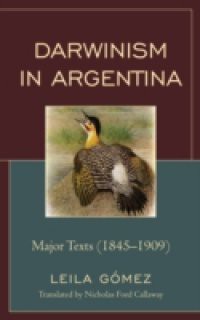Darwinism in Argentina: Major Texts (1845-1909) brings together essays, letters, short-stories, and public lectures by travelers, scientists, writers, and politicians about Darwin and the theory of evolution in nineteenth century Argentina. This selection of texts provides a thorough overview of the socio-ideological implications of the theory of evolution in South America, as well as the intellectual debate this scientific theory promoted in the discourses of fiction, law, history, and medicine in the formation of modern Argentina. Some writers in this book considered the theory of evolution to be Argentinean because Darwin first conceived his theory traveling in the Beagle, across ';the big cemetery of glyptodont and megatherium fossils' on the pampas and in Patagonia. This anthology includes texts from William H. Hudson, Francisco Muiz, Florentino Ameghino, Eduardo Holmberg, Domingo F. Sarmiento, Hermann Burmeister, the Perito Moreno, Leopoldo Lugones, Jose Mara Ramos Meja, and Jose Ingenieros, among others. Many of these texts have not been translated to English or reprinted until this edition, which was originally published with fewer texts in Spanish in 2008. Leila Gomez's introduction reconstructs the historical-scientific contexts of the Darwinist debate in Argentina, the role of paleontology as modern discipline in South American countries, and the tensions between metropolitan and local scientific knowledge. Both the anthology and the introduction present a panorama of Darwin and evolution in Argentina, and the complex mechanism of inclusion and exclusion of indigenous, African descendants, mestizos, and immigrants in the modern nation. Darwinism in Argentina provides critical perspectives on evolutionism in South America that will interest students and specialists in literature, history, and science.

